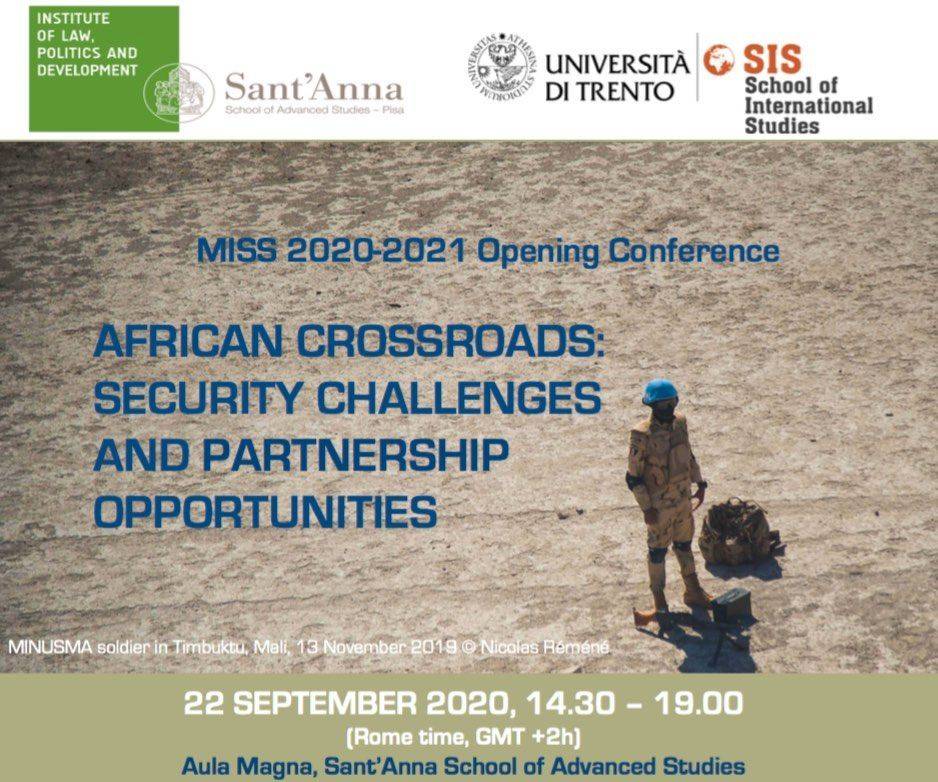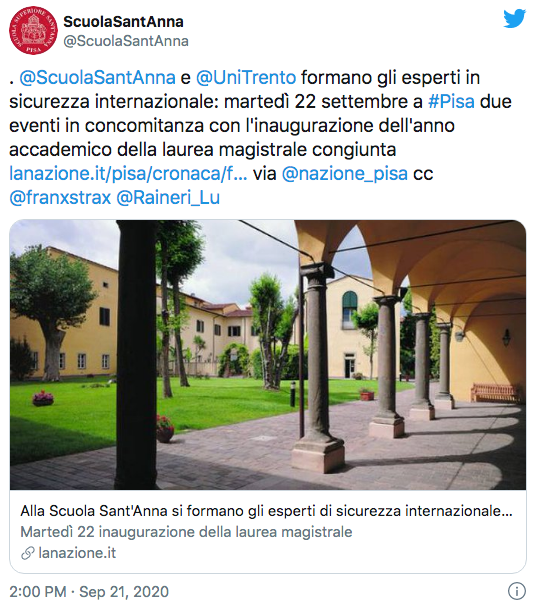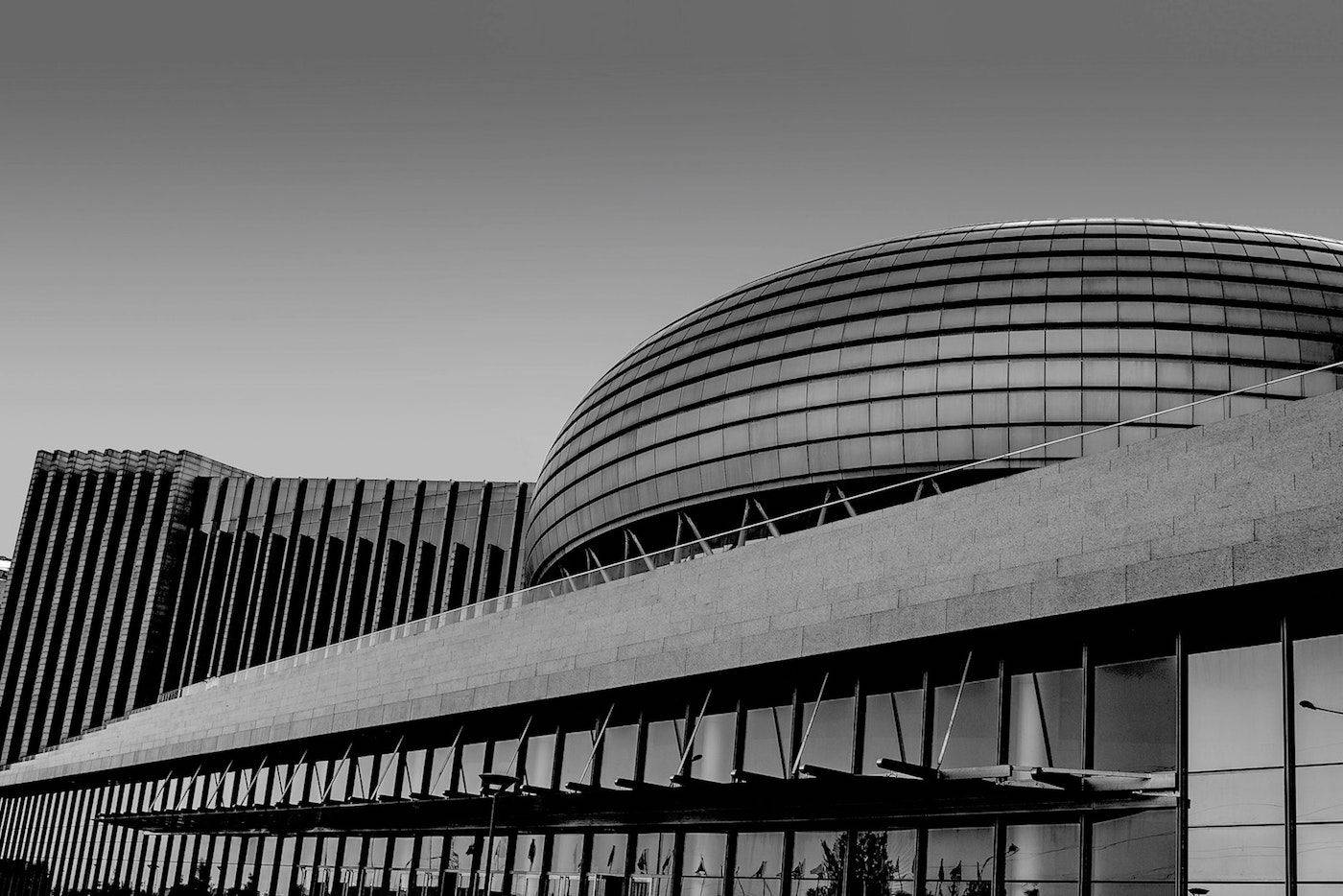In the last decade, many African countries have experienced an economic growth rate among the world’s highest. In 2019, Ethiopia was the second-fastest growing economy globally,with an average ten-year real GDP growth of 9.5 percent. Similarly, countries like Ghana, Kenya, Rwanda, and Tanzania are growing at average annual rates over 6 percent, i.e., more than China. Mainly due to its increasing development potential and to the renewed security challenges ranging from countering terrorism to tackling climate change, the African continent is once again in the spotlight of many actors: from the United States and the European Union, to China, Japan, the Russian Federation, the Gulf States, and Turkey.
Taking cue from the current situation, the conference “African Crossroads: Security Challenges and Partnership Opportunities” took place in Pisa on the 22ndof September 2020. The event coincided with the opening ceremony of the Master in International Security Studies– jointly offered by the Sant’Anna School of Advanced Studies and the School of International Studies of the University of Trento.

The European Union and Africa: Cooperation Amidst Growing International Competition
The conference was introduced by a keynote address of Koen Vervaeke, the Managing Director for Africa at the European External Action Service (EEAS). While the EU is Africa’s first partner in development cooperation, Vervaeke stressed that “it is not sufficient to be the first partner, [the EU] need[s] to be the best partner.” As the EU’s “tradition of partnership” is rooted in the principles of interdependence and shared responsibilities, bilateral agreements may take longer to be defined yet they are also deeper and more reliable, granting long-term results at continental and country level. According to Vervaeke, three main areas of interest drive EU partnerships with Africa. The first relates to African countries’ expected demographic growth that will create a significant imbalance between Africa and the EU, ultimately affecting migration flows. This remains an important issue, as it is critical not only for the EU’s external action but also domestically for many EU member states where migration has become a political issue. A second policy focus is that of promoting a green transition, as the totality of the African countries ratified the Paris Agreement and the “Green Deal” remains a top priority in the Global European Agenda. The last domain is the promotion of stability, to be ensured in particular in regions of high EU priority: the Sahel and the Horn of Africa.
The contribution by Professor Mehari Maru, Lead Migration Expert, and Chief Strategist at the Intergovernmental Authority on Development (IGAD) and with twenty-year working experience in the African Union (AU), stressed instead that the EU, when dragged into a global competition, is at risk of losing sight of the key principles of its cooperation with Africa, namely the promotion of good governance and human rights. While the EU reinforced its credibility over the years through these values, concretely, their importance appears to be diminishing in EU cooperation with Africa. Illustrations of this trend include the EU’s growing willingness to cooperate with authoritarian regimes and to tolerate (if not cause) serious human rights abuses in the context of the fight against irregular migration. Against the rising multipolar order, African countries have a wealth of options in choosing their partners. Some international partners (e.g., USA) are more interested in using Africa as a bargaining chip for competition than for the sake of promoting African needs. The EU should not give in to this trend, focusing instead on multilateralism and partnerships with a view to “promising few and delivering effectively and more,” especially with regards to human rights.

Border Economies, Border Politics
In the last years, the EU-Africa cooperation has laid considerable emphasis on borders. While cross-border free-trade areas have been presented as an economic opportunity, EU official discourse equated cross-border movements of people to a security threat connected to irregular migration and the uncontrolled spread of rebel and jihadist groups.
According to Professor Mamadou Tidjani Alou, of the University of Niamey, the borders resulting from decolonisation were drawn on paper, often without reflecting the divisions and cohesions of local societies. The narrative on borders and borderlands has shifted from a mark of independence to that of areas of turmoil requiring stabilization. Nonetheless, by characterizing these areas only in terms of conflict, borderlands could be inaccurately perceived as “no man’s lands”. Today, trans-bordering regions still harbour processes of social reconfiguration which benefit from borders’ porosity. As local states impose their control by physical and coercive means (e.g., checkpoints), the integration of local societies dependent on transborder interactions is undermined. To the people that have traditionally populated border areas, borders are just “imaginary lines on papers”: and it is only by taking social needs into greater consideration that it could be possible to “re-imagine” the function and added value of borders and nation-states for the local populations.
Professor Mirjam De Bruijn, from the University of Leiden, addressed the issue of borders by focusing on technologies of communication and trans-border politics. De Bruijn emphasised the importance of digital technologies in the Sahel: social media are, at once, bringing together communities sometimes divided by state borders, and reconfiguring identities by reshaping social and geographical borders. Through digital communication and in particular due to the capillary diffusion of mobile phones, populations characterized by high mobility, such as the Fulani, manage to take part in a network of communications that could also be exploited for aggressive purposes.
Professor Georg Klute, of the University of Bayreuth, further insisted that borders, just like any institution, are social constructions. Despite border guards’ presence, Klute stressed the role of the border populations in accepting the existence of fixed borders. Such acceptance is particularly visible when looking at the change of attitude by those living in territories occupied and administered by jihadists. In many cases, “borderlanders” who first reject the jihadists’ authority may end up recognizing that this is better than past forms of governance, even if they do not support radical ideologies. Ultimately, according to Prof. Klute, such gradual acceptance has changed the imagination of borders as new realities have reshaped the frontiers, finally showing their volatility in areas of conflict.
Natural Resources: Curse or Blessing? Appraising the Debate
The growing international attention to Africa is also linked to the continent’s massive reserves of natural resources and their exploitation's economic potential. However, the academic literature has long debated whether natural resources represent a blessing for economic development, or a curse fuelling predation and violent conflicts.
Building on large-scale dataset analysis, Professor Clionadh Raleigh, of the University of Sussex, demonstrated how the Malthusian narrative, according to which climate change exacerbates conflicts is, in reality, unsubstantiated. The environmental link is “absolutely not conducive” to conflict; instead, cooperation appears to be much more likely to emerge in areas affected by climate change, as behaviours of adaptation and mitigation tend to surface when dealing with vulnerabilities caused by force majeure.
Professor Jacob Arsano, of the University of Addis Ababa, stressed the importance of governance. Unrestrained predation and exploitation may turn a natural resource into a curse, yet, if the parties are able to agree on rules of governance, the resource holds the potential of becoming a blessing for the entire community. The examples of land and water corroborate this idea. In the last decade, the so-called land grabbing has attracted foreign investment in Africa, but unregulated speculation has also threatened the survival of local rural communities. Similarly, the lack of an adequate multilateral governance framework for the water of the Nile River Basin may turn the Grand Ethiopian Renaissance Dam from a development opportunity into a security challenge.
Professor Corrado Tornimbeni, from the University of Bologna, stressed that whether natural resources amount to a curse or blessing always depend on one’s interests, perspectives and values. Abstract and distant analyses risk overlooking that the governance and management of natural resources always generates winners and losers, and that one resource can have different meanings to different actors. Global political paradigms, changing over time, are also crucial to understand the politics of natural resources’ exploitation. For instance, after 9/11, the shift away from the commitment to democracy promotion to a focus on political stability and security has changed the structural incentives of the conclusion of agreements with African governments by foreign investors.
A strong emphasis on partnership and human rights, borders and digitalization, governance, and natural resources is the conference’s main takeaway. These keywords are likely to permeate the future engagement with Africa for both policy-makers and scholars, and provide a valuable illustration of the kaleidoscopic variety of domains that security concerns intercept.
Cover photo: African Union Headquarters in Addis Ababa, Ethiopia, by Solen Feyissa, on Unsplash.
